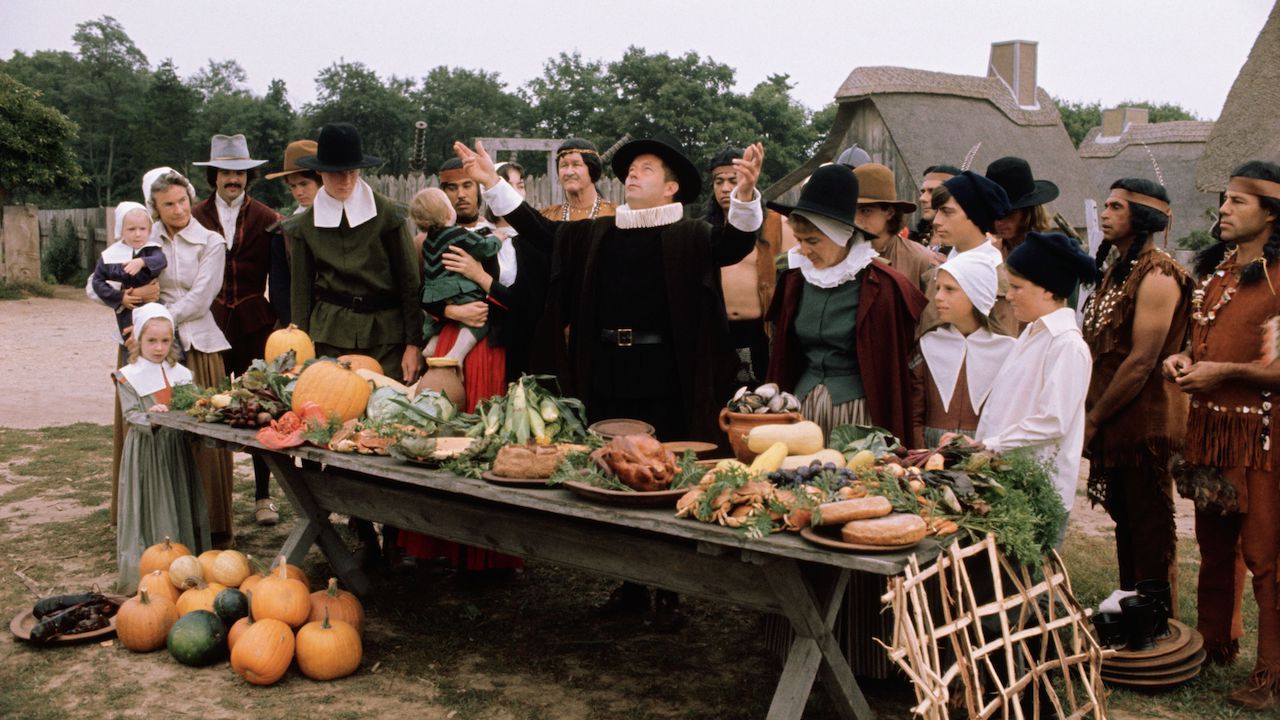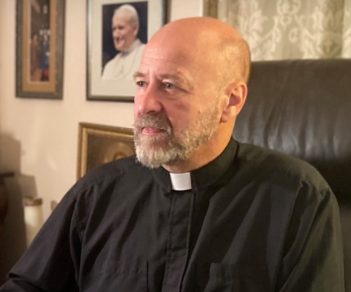
People are sometimes confused by my accent. “Are you English?” they ask. Not with a name like mine! No indeed. I am a Yank through and through. I was brought up in Pennsylvania and went to college in South Carolina, but the English accent thing is because I overdosed on C.S. Lewis and T.S. Eliot and on a youthful dream, a touch of luck, a dash of chutzpah and a large dose of divine Providence I went to study at Oxford and live in England. For twenty-five years I lived in that beautiful, damp land. For twenty-five years I did not celebrate the American feast of Thanksgiving.
However, during my exile I did eat turkey at Christmas with the English. I cracked the Christmas cracker. I wore the paper crown. I ate soft brussels sprouts, drank the sweet sherry with Christmas cake. I saw them set the Christmas pudding aflame and imagined I was in a story by Dickens. The next day I celebrated Boxing Day without ever discovering why it was called that. I went to the pantomime, watched the Queen’s Speech and fell asleep in front of the fire with a full stomach, a cup of tea and a slice of Christmas cake by my side. I learned to thoroughly enjoy the English Christmas. There was turkey and stuffing and family and feasting and fun. But it wasn’t Thanksgiving.
Then five years ago, through one of God’s practical jokes, I came back to South Carolina with my English wife and English-sounding kids to be a Catholic priest. Along with learning to live in the suburbs and shop at the mall, and spend hours in the car, and have far too much of far too many good things, we also learned to celebrate Thanksgiving. I, of course, still knew all the rituals, and was able to share them with my family, and now back in my homeland I’m delighted to eat turkey twice within weeks, for we now celebrate both American Thanksgiving and English Christmas.
This personal resurrection of Thanksgiving has caused me to examine again the roots of the tradition, and while I know all about Pilgrims and the Mayflower and the kindly Indians and cranberries and sweet potatoes and turkeys and corn and pumpkin pie, I’m more fascinated by the deeper history of Thanksgiving feasts, for the Protestant idea of a feast for thanksgiving has roots that are deeper than they knew.
The Thanksgiving meal celebrated by the pilgrims, the settlers in Canada and earlier by Spanish settlers in Florida had its roots in well-established European harvest time traditions. When I moved to England I was delighted to find that, although they didn’t celebrate Thanksgiving as such, most Anglican parishes celebrated Harvest Festival in the Autumn. The church would be decorated with autumn flowers, colorful pumpkins, squash and everyone would bring tinned goods to be distributed to the poor. Some of them joked that this was their Thanksgiving — giving thanks that they had got rid of all those troublesome Puritans. So still the English celebrate harvest festival — a medieval custom which somehow survived the stripping of the altars. This treasured tradition, however, has deeper roots which the Protestants first rejected, then forgot.
For, of course, in Greek the word ‘Thanksgiving’ is ‘Eucharist’, and the Eucharistic sacrifice of the Mass has its roots in the Jewish thanksgiving sacrifice called the todah which is Hebrew for ‘thanksgiving and praise.’ Anyone familiar with the Old Testament religion may know about sacrifices such as the holocaust offering, sin offering or burnt offering, but not many will be aware of the todah.
A todah sacrifice would be offered by someone whose life had been spared. Maybe they recovered from a disease or survived a deadly battle. The person who had scraped through would call his friends and family together and celebrate a todah sacrificial meal. A lamb would be sacrificed in the Temple by the priest, and then some bread would be consecrated just at the moment the lamb was sacrificed. The bread and meat, along with wine, became the menu for the thanksgiving meal. Along with the meal would be prayers and psalms of praise and thanksgiving.
The todah was an important ritual in the temple religion during the reign of David and the psalms used in that worship, with their emphasis on thanksgiving and praise, are clearly the ‘hymnbook’ used in the frequent and important todah sacrifice.
However, the thanksgiving sacrifice of the Jews becomes even more interesting as the context for the Last Supper. In an important article explaining the todah, Tim Gray points out that “the German biblical scholar Hartmut Gese claimed that the todah stands behind what Jesus did at the Last Supper. He goes so far as to argue that Jesus’ giving thanks over the bread and wine came in the context of a todah sacrifice rather than a Passover meal.”
However, most other scholars say the Last Supper was the Passover Meal. Gray goes on to argue that the Last Supper was both a Passover and a todah meal because, he says,
The Passover has all the same elements found in the todah: bread, wine, and sacrifice of a lamb, along with hymns and prayers. Indeed, the Hallel psalms (113-118), that were sung during the Passover meal were all also used as the todah psalms… The Passover narrative has both the form and content of the todah, because it is a concrete example of a todah sacrifice.
Gray points out that “Philo, a first-century Jew, describes the Passover as a festival of thanksgiving. And this festival is instituted in remembrance of, and as giving thanks [eucharistia] for their great migration which they made from Egypt. The two main reasons for the Passover therefore, were remembrance and thanksgiving.”
When we celebrate the Thanksgiving Meal of the Eucharist, we thank God for our deliverance from the bondage of sin and give thanks for Christ the Passover Lamb who was slain. We give thanks for our salvation. We recall the once-for-all sacrifice, bring it into the present moment and celebrate the feast. As such we re-live not only the Paschal mystery but the earlier Passover mystery of Exodus.
And isn’t the pilgrimage of the settlers in the new world also a kind of Exodus story? They went out from the land of bondage and made a long, hard journey to the promised land. Therefore the theology of Thanksgiving is the theology of Passover. We celebrate not just the good things we have, but our deliverance from bondage, our hard won freedoms and our souls’ salvation.
Our history as Americans is a kind of Passover story if we have eyes to see, and when we celebrate Thanksgiving this week, maybe we should all take some time around the table to discuss not just the Pilgrims and Indians, and all the good things we have, but also the older history of our redemption and release, the deeper mystery of our pilgrimage from the bondage of sin, our hope for the promised land, and thus the deeper theology of thanksgiving.
 Author: Father Dwight Longenecker
Author: Father Dwight Longenecker
Father Dwight Longenecker is the pastor of Our Lady of the Rosary parish in Greenville, South Carolina. He is the author, most recently, of Immortal Combat: Confronting the Heart of Darkness (Sophia Institute Press, 2020). Read more at www.dwightlongenecker.com.